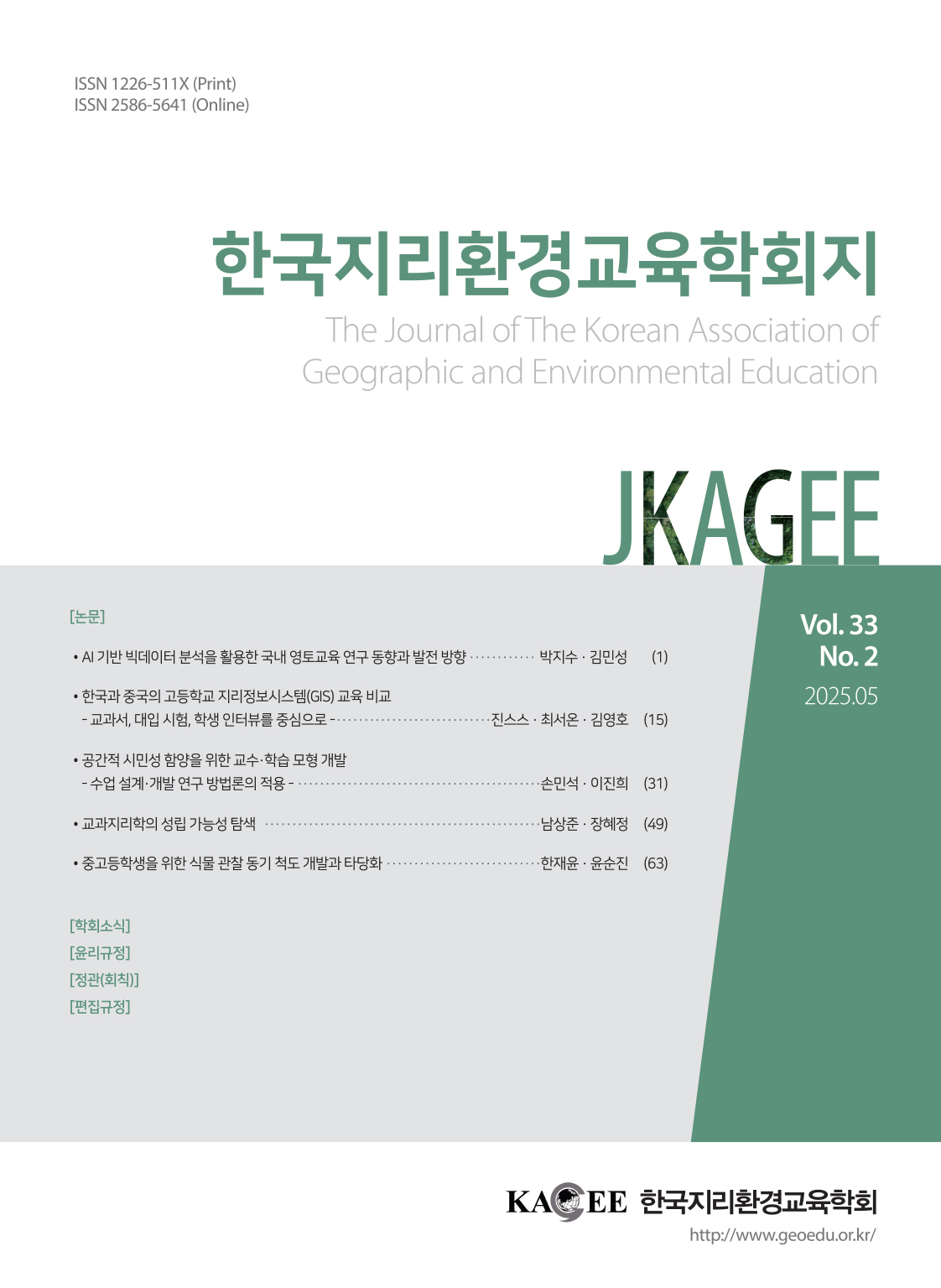Research Article
Abstract
References
Information
The South Korean government has recently announced a policy agenda in which democratic citizenship education newly emerged as a vehicle for Korean society to become more inclusive. This study theoretically examines the meaning of inclusive geography education for democratic citizenship in schools. The approaches to the assumption, the subject, and the direction of inclusion are particularly examined for this inquiry. By drawing on literature on political philosophy, citizenship education, and geography education, this study critically problematizes whether the traditional understanding of inclusion in school geography may impair the development of students’ democratic citizenship. Instead, this paper argues that, by underpinning the premise of inclusion as a political process, inclusive school geography should become a political stage in which the existing orders of the world can be critically disrupted. For re-inventing inclusive school geography, this study ends by suggesting some concrete curricular ideas.
최근 한국 정부는 보다 포용적인 한국 사회로의 이행을 위해 학교 민주시민교육의 활성화를 국정 과제로 선정하였다. 본 연구는 민주 시민성을 지지할 수 있는 포용적 학교 지리교육의 의미를 이론적으로 탐색하는데 있다. 이를 위해 본 연구는 민주주의의 핵심 가치로서 평등의 실질적 실현 여부에 주목한다. 평등의 전제, 대상 및 방향이라는 측면에서 정치철학, 시민교육 및 지리교육 연구에 대한 검토를 바탕으로, 본 연구는 기존의 학교지리가 ‘나’ 중심의 구심성을 전제로 한 동화적 포용을 통해 포스트 민주주의 질서를 강화할 가능성을 제기한다. 그 대신 필자는 정치성, 혁신성의 공간으로서 포용적 지리교육으로의 전환을 주장한다. 끝으로, 본 연구는 새로운 지리교육을 위해 교육과정 개정 시 고려할 몇 가지 요소들을 제안한다.
- 교육부, 2018, 민주시민교육 활성화를 위한 종합계획, 세종: 교육부.
- 김갑철, 2016, “세계 시민성 함양을 위한 지리교육과정의 재개념화”. 대한지리학회지, 51(3), 455-472.
- 김다원, 2016, “세계시민교육에서 지리교육의 역할과 기여-호주 초등 지리교육과정 분석을 중심으로”, 한국지리환경교육학회지, 24(4), 13-28.
- 김병연, 2011, “생태 시민성 논의의 지리과 환경 교육적 함의”, 한국지리환경교육학회지, 19(2), 221-234. 10.17279/jkagee.2011.19.2.221
- 김병연・조철기, 2020, “사회-자연 이분법을 넘어선 도시 이해를 위한 '인간-너머의' 지리교육 가능성 탐색”. 한국지역지리학회지, 26(4), 436-448. 10.26863/JKARG.2020.11.26.4.436
- 김원석・옹진환・정하윤・정원규, 2020, “민주시민교육 내용 규정 및 프로그램 활성화 방안에 관한 연구”, 기억과 전망, 42, 210-254. 10.31008/MV.42.5
- 김학희, 2005, “지리교육 소재로서 음식의 확정성에 관한 연구”, 한국지리환경교육학회지, 13(3), 375-391.
- 뉴시스, 2020, '욕설에 침뱉고 폭력도'...미국, 아시아계 혐오범죄 급증, https://newsis.com/view/?id=NISX20200706_0001085136&cID=10101&pID=10100. 2020.7.9. 접속.
- 박기순, 2013, “자크 랑시에르, 잊혀진 이름의 귀환: 국내의 랑시에르 연구 현황”, 역사비평, 349-371.
- 박선희, 2008, “지리교육에서 다문화교육을 위한 교수-학습 방안 모색: 한국지리(7차 개정시안)를 중심으로”, 한국지리환경교육학회지, 16(2), 163-177.
- 배미애, 2004, “세계교육과 다문화교육의 연계 및 지리교과에서의 의의”, 교과교육학연구, 8(1), 105-122.
- 심광택, 2014, “생태적 다중시민성 기반 사회과의 핵심개념과 핵심 과정”, 사회과교육, 53(1), 21-39.
- 심광택, 2020, “지속가능성 및 세계시민성을 지향하는 사회 (지리)과 미래 학습의 논리”, 한국지리환경교육학회지, 28(1), 1-17.
- 심성보, 2017, “한국 민주시민교육의 현황과 과제”, 한국학논집, 67, 93-122. 10.18399/actako.2017..67.003
- 양창렬, 2016, “자크 랑시에르: 제도도 이념도 아닌 민주주의론”, 진보평론, 68, 59-87.
- 엄은희, 2009, “제3세계 환경문제에 대한 환경정의적 접근과 지리교육의 과제”, 한국지리환경교육학회지, 17(1), 59-71. 10.17279/jkagee.2009.17.1.59
- 연합뉴스, 2020, 코로나로 커지는 외국인 혐오...영국 한인유학생도 폭행당해. https://www.yna.co.kr/view/AKR20200421000600085?input=1179m. 2020.7.9. 접속.
- 윤영광, 2014, “탈정체화의 정치: 랑시에르 정치철학에서 주체(화) 문제”, 문화과학, 77, 295-318.
- 이동민・최재영. 2015, “다중스케일적 접근의 지리교육적 의의와 가능성-초등사회과 세계지리 영역에서의 지역 인식 문제를 중심으로”, 한국지리환경교육학회지, 23(2), 1-17. 10.17279/jkagee.2015.23.2.1
- 이희상, 2012, “글로벌푸드/로컬푸드 담론을 통한 장소의 관계적 이해”, 한국지리환경교육학회지, 20(1), 45-61. 10.17279/jkagee.2012.20.1.45
- 장의선, 2010, “세계지리의 다문화 교육적 가치에 관한 연구-대학수학능력시험 문항 분석을 중심으로”, 사회과교육, 49(2), 185-201.
- 조철기, 2015, “글로컬 시대의 시민성과 지리교육의 방향”, 한국지역지리학회지, 21(3), 618-630.
- 조철기, 2018, 핵심 지리교육학, 서울: 푸른길.
- 조철기, 2020, 시민성의 공간과 지리교육, 서울: 푸른길.
- 조철기・김병연, 2020, “포토보이스의 지리 교수 및 학습 도구로서의 가능성과 함의 탐색”. 한국지역지리학회지, 26(3), 272-287. 10.26863/JKARG.2020.8.26.3.272
- 최병두, 2017, “관계적 공간과 포용의 지리학”, 대한지리학회지, 52(6), 661-682.
- 최정숙・조철기, 2009, “음식을 소재로 한 세계시민성 교육의 전략 및 효과 분석: 커피와 공정무역을 중심으로”, 한국지리환경교육학회지, 17(3), 239-257.
- 황규덕・박배균, 2019, “지리교육에서 장소 이해에 대한 관계적 전환의 필요성에 대한 소고”, 한국지역지리학회지, 25(1), 20-37. 10.26863/JKARG.2019.02.25.1.20
- Abowitz, K. K. and Harnish, J., 2006, Contemporary discourses of citizenship.
Review of Educational Research , 76(4), 653-690. doi: 10.3102/003465430 76004653 10.3102/00346543076004653 - Arnot, M., 1997, 'Gendered Citizenry': New feminist perspectives on education and citizenship.
British Educational Research Journal , 23(3), 275-295. doi: 10.2307/1502045 10.1080/0141192970230303 - Ball, S., 1994,
Education reform: A critical and post-structural approach . Buckingham: Open University Press. - Biesta, G., 1995, Postmodernism and the repoliticization of education.
Interchange , 26(2), 161-183. 10.1007/BF01435145 - Biesta, G., 2009, Sporadic democracy: Education, democracy, and the question of inclusion. In
Education, democracy, and the moral life (pp. 101-112). Dordrecht: Springer. 10.1007/978-1-4020-8626-7_8 - Blattberg, C., 2003, Patriotic, not deliberative, democracy.
Critical review of international social and political philosophy , 6(1), 155-174. 10.1080/13698230510001702723 - Blühdorn, i. and Butzlaff, F., 2020, Democratization beyond the post-democratic turn: towards a research agenda on new conceptions of citizen participation,
Democratization , 27:3, 369-388, DOI: 10.1080/13510347.2019.1707808 10.1080/13510347.2019.1707808 - Butt, G., 2001, Finding its place: contextualising citizenship within the geography curriculum. In
Citizenship through secondary geography (pp. 92-92). London: Routledge.
Butzlaff, F., 2020, Between empowerment and abuse: citizen participation beyond the post-democratic turn. - Cook, I., 2008, What is geography's contribution to making citizens?
Geography , 93, 34-39. 10.1080/00167487.2008.12094217 - Civics Expert Group, 1994,
Whereas the people: Civics and citizenship education . Canberra: Australian Government Publishing Services. - Crick, B., 1998,
Education for citizenship and the teaching of democracy in schools . London: Qualifications and Curriculum Authority. - Crouch, C., 2004,
Post-democracy , Cambridge: Polity Press. - Crouch, C., 2016, The march towards post-democracy, ten years on.
The political quarterly , 87(1), 71-75. 10.1111/1467-923X.12210 - Davidson, M. and Iveson, K., 2015, Recovering the politics of the city: From the 'post-political city' to a 'method of equality' for critical urban geography.
Progress in human geography , 39(5), 543-559. 10.1177/0309132514535284 - Dryzek, J. S., 2000,
Deliberative democracy and beyond: Liberals, critics, contestations . Oxford: Oxford University Press. - Eisner E. W., 2005, Instructional and expressive educational objectives. Their formulation and use in curriculum. In: Eisner EW (ed.)
Reimagining Schools. The Selected Works of Elliot W (pp.24-36).Eisner . London: Routledge. - Foucault, M., 1980,
Power/knowledge: selected interviews and other writings 1972-1977 (C. Gordon, Trans.). Brighton: Harvester Press. - Gibson, M., 2020, From deliberation to counter-narration: Toward a critical pedagogy for democratic citizenship.
Theory & research in social education , 48(3), 431-454. 10.1080/00933104.2020.1747034 - Held, D., 1987,
Models of democracy , Cambridge: Polity Press. - Heater, D., 1990,
Citizenship: the civic ideal in world history, politics and education . London: Longman. - Hicks, D., 1981, Images of the world: what do geography text books actually teach about development?
Cambridge Journal of Education , 11(1), 15-35. 10.1080/0305764810110102 - Jackson, P., 2006, Thinking Geographically.
Geography , 91(3), 199-204. 10.1080/00167487.2006.12094167 - Kim, G., 2019, Critical thinking for social justice in global geographical learning in schools.
Journal of Geography , 118(5), 210-222. 10.1080/00221341.2019.1575454 - Kim, G., 2020, The (Im)possibility of global citizenship education in school geography.
Journal of Geography , 119(3), 98-107. 10.1080/00221341.2020.1748690 - Lambert, D. and Machon, P., 2001,
Citizenship through secondary geography . London: Routledge. - Maclure, J., 2006, On the public use of practical reason.
Philosophy and socail criticism. 32(1), 37-63. 10.1177/0191453706059845 - Maddrell, A. M., 1996, Empire, emigration and school geography: changing discourses of Imperial citizenship, 1880-1925.
Journal of Historical Geography , 22(4), 373-387. 10.1006/jhge.1996.0025 - Massey, D., 2014, Taking on the world.
Geography , 99(1), 36-39. 10.1080/00167487.2014.12094389 - Morgan, J., 2003, Imagined country: National environmental ideologies in school geography textbooks.
Antipode, 35(3), 444-462. 10.1111/1467-8330.00334 - Noël, A., 2006, Democratic deliberation in a multinational federation.
Critical revidw of interational social and philosophy , 9(3), 419-444. 10.1080/13698230600901212 - Osberg, D., Biesta, G. and Cilliers, P., 2008, From representation to emergence: Complexity's challenge to the epistemology of schooling.
Educational philosophy and theory , 40(1), 213-227. 10.1111/j.1469-5812.2007.00407.x - Puttick, S. and Murrey, A., 2020, Confronting the deafening silence on race in geography education in England: learning from anti-racist, decolonial and black geographies.
Geography , 105(3), 126-134. 10.1080/00167487.2020.12106474 - Pykett, J., 2010, Designing identity: exploring citizenship through geography.
Geography , 95, 132. 10.1080/00167487.2010.12094296 - Rancière, J., 1991,
The ignorant schoolmaster . Stanford: Stanford University Press. - Rancière, J., 1995,
On the shores of politics . London: Verso. - Rancière, J., 1999,
Dis-agreement. Politics and philosophy . Minneapolis: University of Minnesota Press. - Scott, D., 2008,
Critical Esseys on Major Curriculum Theorists . London: Routledge. 10.4324/9780203461884 - Sears, A. and Hughes, A., 2006, Citizenship: education or indoctrination.
Citizenship and Teacher Education , 2(1), 3-17. - Shin, E. E. and Bednarz, S. W., 2018,
Spatial citizenship education: citizenship through geography . London: Routledge. 10.4324/9781315165356 - Slater, F., 2001, Values and values education in the geography curriculum in relation to concepts of citizenship. In D. Lambert & P. Machon (Eds.),
Citizenship through Secondary Geography (pp.42-67). London: Routledge Falmer. - Strassheim, H., 2020, De-biasing democracy. Behavioural public policy and the post-democratic turn,
Democratization , 27:3, 461-476, DOI: 10.1080/13510347.2019.1663501 10.1080/13510347.2019.1663501 - Stoltman, J. P., 1990,
Geography Education for Citizenship . Indiana: The social studies development center. - The New York Times. 2021, https://www.nytimes.com/interactive/2020/07/03/us/george-floyd-protests-crowd-size.html, Black Lives Matter May Be the Largest Movement in U.S. History, Retrieved in 8 January 2021.
- Tyler, L., 1949,
Basic principles of curriculum and instruction . Chicago: The University of Chicago Press. - Young, I., 2000,
Inclusion and democracy . Oxford: Oxford University Press. - Warren, M., 1992, Democratic theory and self-transformation.
The American Political Science Review , 8-23. 10.2307/1964012 - Winter, C., 2018, Disrupting colonial discourses in the geography curriculum during the introduction of British Values policy in schools.
Journal of Curriculum Studies , 50(4), 456-475. 10.1080/00220272.2018.1428366
- Publisher :The Korean Association Of Geographic And Environmental Education
- Publisher(Ko) :한국지리환경교육학회
- Journal Title :The Journal of The Korean Association of Geographic and Environmental Education
- Journal Title(Ko) :한국지리환경교육학회지
- Volume : 29
- No :2
- Pages :19-32
- DOI :https://doi.org/10.17279/jkagee.2021.29.2.19



 The Journal of The Korean Association of Geographic and Environmental Education
The Journal of The Korean Association of Geographic and Environmental Education







